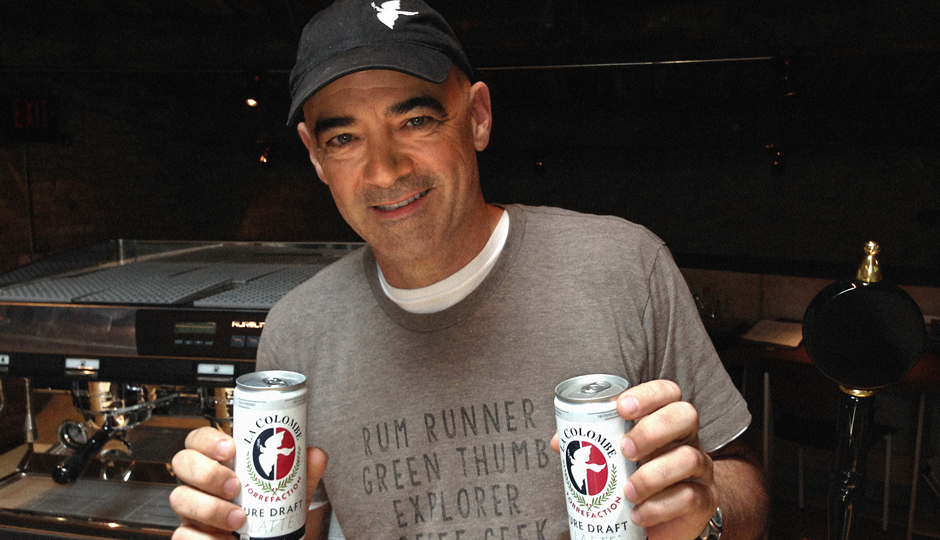La Colombe’s Plan to Destroy Starbucks: A Canned Latte Worth Drinking

La Colombe CEO Todd Carmichael shows off his latest creation: Draft latte in a can. (Photo by Jared Shelly)
If you stopped by La Colombe‘s flagship location in Fishtown this weekend, you were likely offered a sample of its latest creation: The draft latte — a coffee and milk combo poured from a keg that has a semi-sweet taste and a slight milkshake-like texture. The best part is that there’s no ice diluting the drink and screwing up the taste.
But that bit of frothy good news is just the beginning. The company plans to start producing cans of the draft latte to sell in stores across the country. CEO Todd Carmichael thinks it’s a product that can seriously disrupt a market dominated by Starbucks and its bottled Frappuccino.
“This is the beverage that Philadelphia is going to export to the rest of the world,” said Carmichael, who’s also the star of Dangerous Grounds on the Travel Channel. “Philadelphia is going to be home base for the next generation of coffee.”
The release of the canned latte adds to an already busy year for La Colombe, which plans on opening 100 cafes across the country including it’s soon-to-open spot near Independence Hall. But the real killer is the new canned latte. It has no added sugar, but instead pressurizes the milk molecules to release its natural sugar. The Starbucks brand of a bottled beverage has 32 grams of sugar and Carmichael calls it “a waste of caloric intake.”
“If I had three of those per day, I’d be obese by the end of the year,” he said. “You shouldn’t consume that much sugar in one 10-ounce drink. Unless you’re getting a buzz. If it were a cocktail, I’d be good with it.”
And to disrupt the market even further, Carmichael wants his product to cost under $2 per can. Although he doesn’t expect to make a profit in the first year, he believes its accessibility will eventually lead to serious volume across the country.
“The bottled coffees you’re seeing on shelves average $2.79. That’s asinine,” said Carmichael. “It has to be in the dollar-something range. It has to be the price of a soda because it should be. I’m selling America’s favorite beverage here. We drink more coffee than anything else combined. It’s the American drink.”
When asked where he’d like to sell the product, he answered: “Fuckin’ everywhere. As many people as possible. I would like at least half of America to have had the opportunity to taste my creation in the next three years.”
He plans to start with eight retailers who have been particularly influential to a “farm boy” who loves great, natural food. He mentioned Wegmans, Whole Foods and Publix specifically. Although no deals have been made just yet, he says they’re more than excited.
“I brought them into my lab and told them this was coming,” he said. “They all collectively went ‘holy shit, when is this going to happen? When you’re ready, let’s go.’ ”
On the bottling side, Carmichael is building out a Port Richmond site a block away from his roastery that can produce 10,000 cans per day. He also made a joint-venture agreement with Philly’s own Crown Holdings to make much larger batches. He sees the Port Richmond plant as a test kitchen where he’ll experiment with other draft coffee/milk combos like a mocha. Ever the perfectionist, Carmichael added some special ingenuity to the cans. They come with a built-in valve on the bottom to make sure the levels of gas inside create a perfect foamy texture. They also have a plastic lip guard so the mind can process it less like a soda or beer, and more like a coffee.
Carmichael said the draft latte emerged from a six-month period of innovating and inventing. He and his team spent hours in the “coffee lab” on the second floor of the Frankford Avenue flagship, adding nitrous oxide and nitrogen to milk and coffee mixes before coming up with the perfect blend. He also visited dairy farms, the Kraft test kitchen and a small whipped-cream plant in upstate New York. In fact, after our interview he was on his way to visit an ice cream factory.
“I drove my friends, colleagues, employees and my wife mad with it,” he said. “It was a very short, intense creative period.”
While the rollout isn’t too far off, don’t expect to see La Colombe cans on the shelves outside Philadelphia for a while.
“I’m spending the first five months just limited to Philadelphia and the greater area. This is a Philadelphia product. You’ve got to be famous at home before going on tour,” he said. “I don’t want it to become a New York thing. I have cafes in New York and if I go to New York, it will get the credit for this. Philly is where I started. This is home. What I love about Philadelphia is that if I need to adjust the drink, they’ll tell me. Talk about a focus group.”


